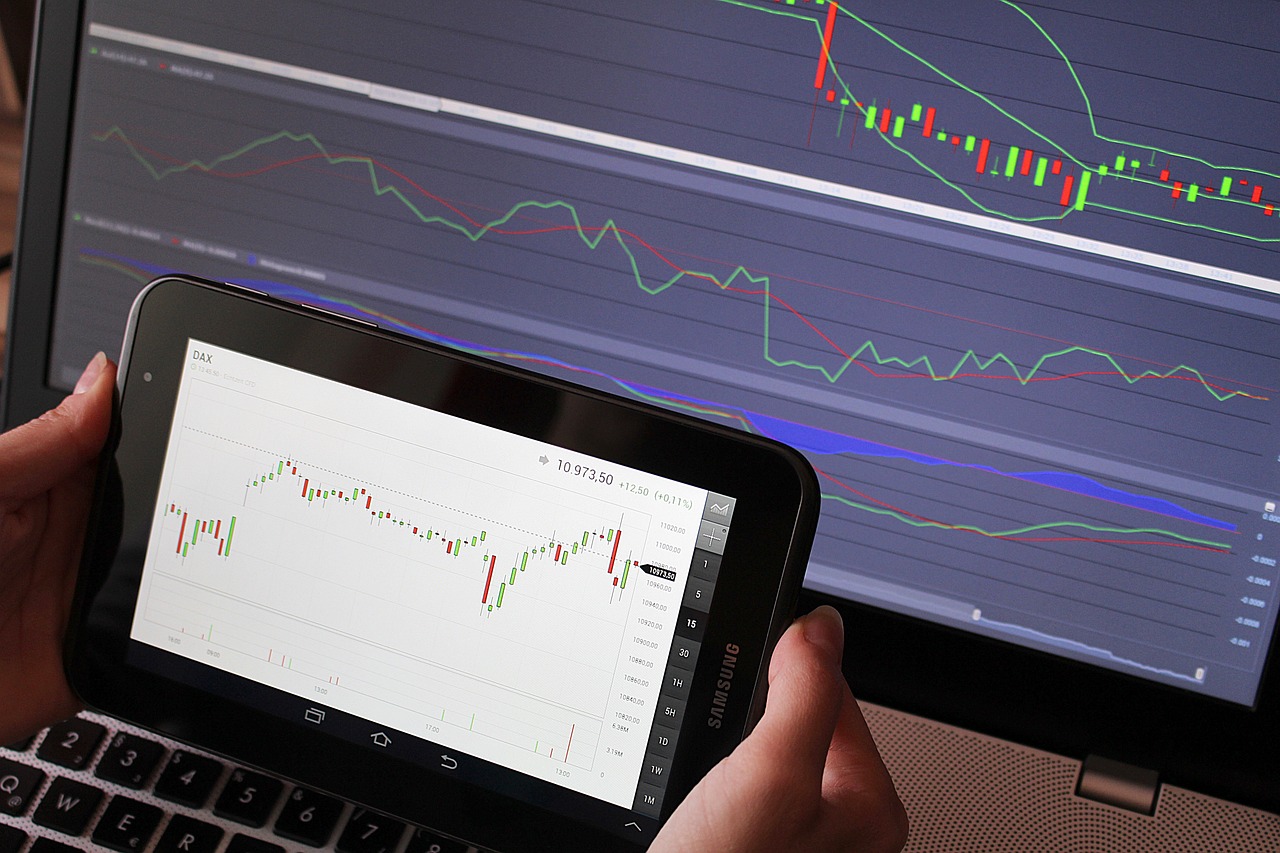How to Keep Emotions Out of Your Trading
Trading can often feel like a rollercoaster ride, filled with thrilling highs and gut-wrenching lows. But what if I told you that the key to a smoother, more profitable journey lies in keeping your emotions in check? That's right! Emotions like fear and greed can cloud your judgment, leading you to make impulsive decisions that could derail your trading success. So, how do you maintain that all-important emotional discipline? Let's dive into some strategies that can help you stay focused and rational, no matter what the market throws your way.
Emotional discipline is like the anchor in a stormy sea; it keeps you grounded when everything around you feels chaotic. When traders lack this discipline, they often veer off course, abandoning their carefully laid strategies in favor of impulsive reactions to market fluctuations. Imagine trying to navigate a ship without a compass—it's easy to get lost! By understanding the significance of emotional discipline, you can improve your decision-making process and reduce those knee-jerk reactions that often lead to losses. In essence, emotional discipline allows you to stay true to your trading plan and maintain a clear mindset.
Every trader, no matter how seasoned, can fall into emotional traps that hinder their performance. Two of the most common culprits are fear and greed. Recognizing these pitfalls is essential if you want to develop effective strategies to avoid them. Think of it like walking through a minefield; knowing where the mines are located can save you from disaster! By being aware of these emotional traps, you can maintain a clear, rational mindset during your trading activities.
Ah, the infamous FOMO! It’s that nagging feeling that if you don’t jump on a trade right now, you’ll miss out on a fantastic opportunity. This emotion can lead to hasty decisions and poor trades, often resulting in regret. Understanding how FOMO impacts your trading behavior is crucial. Just like a moth drawn to a flame, traders can find themselves making irrational choices that jeopardize their success. So how can you combat this pesky emotion?
Implementing effective strategies can help you mitigate FOMO and make informed decisions. Here are a few approaches:
- Set Clear Goals: Establishing specific trading goals can provide you with a roadmap to follow, reducing the urge to chase after every shiny opportunity.
- Stick to Your Trading Plan: A well-defined trading plan acts as your safety net, allowing you to make decisions based on logic rather than fleeting emotions.
- Practice Mindfulness: Taking a moment to breathe and reflect before making a trade can help you assess whether your decision is driven by FOMO or sound reasoning.
Identifying your personal triggers for FOMO is key to managing it effectively. Is it the buzz of social media? Or perhaps it’s a friend’s success story that gets you anxious? By being aware of these triggers, you can take proactive steps to maintain emotional control in your trading activities. Just like a detective solving a mystery, pinpointing the source of your FOMO can empower you to make better decisions.
Greed is another emotional trap that can lead to disastrous outcomes. It can tempt traders into overtrading, chasing after bigger profits without considering the risks involved. This unchecked desire can lead to significant losses, much like a gambler who can't resist the urge to place one more bet. Recognizing and controlling greed is vital for maintaining a balanced approach to trading. By setting limits and sticking to them, you can ensure that your trading remains disciplined and focused on long-term success.
A well-defined trading plan is your best ally in achieving emotional control. It provides a structured approach to trading, helping you make decisions based on logic rather than emotions. Think of it as a recipe for success; if you follow the ingredients and steps, you're likely to end up with a delicious dish! By enhancing your discipline through a solid trading plan, you can minimize the emotional influences on your decisions.
Establishing clear, achievable goals is like setting your destination before embarking on a journey. It helps you focus on your long-term objectives and reduces the likelihood of emotional decision-making. When your goals are crystal clear, it becomes easier to resist the temptation of impulsive trades driven by fleeting emotions.
Just as you would check your car's engine before a long road trip, regularly reviewing and adjusting your trading plan ensures it remains relevant and effective. This practice fosters discipline, helping you stay committed to your strategies and minimizing emotional influences on your decisions. Remember, the market is ever-changing, and so should your approach be!
- What is emotional discipline in trading? Emotional discipline refers to the ability to control your emotions and stick to your trading plan, even when faced with market volatility.
- How can I overcome fear in trading? You can overcome fear by developing a solid trading plan, setting clear goals, and practicing mindfulness to stay focused on your strategy.
- What are some common emotional traps in trading? Common emotional traps include fear of missing out (FOMO) and greed, both of which can lead to impulsive and irrational trading decisions.

The Importance of Emotional Discipline
This article explores strategies for maintaining emotional discipline in trading. By understanding the psychological aspects of trading, you can improve decision-making and enhance overall trading performance.
Emotional discipline is crucial in trading as it serves as the backbone of a successful trading strategy. Without it, traders can easily fall prey to their emotions, leading to impulsive decisions that can wreak havoc on their portfolios. Imagine trying to navigate a stormy sea without a compass; that's what trading feels like without emotional discipline. You might find yourself tossed around by the waves of fear, greed, and anxiety, making it nearly impossible to stick to your trading plan.
When traders allow their emotions to dictate their actions, they often make decisions that are not only irrational but also detrimental to their long-term goals. For instance, when faced with a market downturn, a trader might panic and sell off their investments at a loss, driven by fear. Conversely, during a market uptrend, the same trader might become overly optimistic, buying into a position without proper analysis, driven by greed. Both scenarios illustrate how a lack of emotional control can lead to significant financial consequences.
To truly understand the significance of emotional discipline, consider the following key points:
- Improved Decision-Making: When emotions are kept in check, traders can make decisions based on data, analysis, and their trading plan rather than fleeting feelings.
- Reduced Impulsive Actions: Emotional discipline helps to minimize impulsive actions that often result in losses, allowing traders to stick to their strategies even when the market gets volatile.
- Consistency in Performance: A disciplined approach leads to more consistent trading results, as traders are less likely to deviate from their established plans.
By cultivating emotional discipline, traders can not only enhance their decision-making abilities but also create a more stable trading environment. This stability allows for a clearer focus on long-term goals, ultimately leading to a more rewarding trading experience. Think of emotional discipline as the rudder of your trading ship; it keeps you on course, even when the waters get choppy.
Traders often fall into emotional traps such as fear and greed. Recognizing these pitfalls is essential for developing strategies to avoid them and maintain a clear, rational mindset during trading.
FOMO can lead to hasty decisions and poor trades. Understanding its impact on trading behavior can help traders develop strategies to combat this emotion and stay focused on their trading plans.
Implementing strategies like setting clear goals and sticking to a trading plan can help mitigate FOMO. This allows traders to make informed decisions rather than emotional ones that could jeopardize their success.
Identifying personal triggers for FOMO is key to managing it effectively. By being aware of these triggers, traders can take proactive steps to maintain emotional control in their trading activities.
Greed can lead to overtrading and significant losses. Understanding how to recognize and control greed is vital for maintaining a balanced approach to trading and ensuring long-term success.
A well-defined trading plan is essential for emotional control. It provides a structured approach to trading, helping traders make decisions based on logic rather than emotions, thus enhancing discipline.
Establishing clear, achievable goals helps traders focus on their long-term objectives. This clarity reduces emotional decision-making and encourages a disciplined approach to trading.
Regularly reviewing and adjusting your trading plan ensures it remains relevant. This practice fosters discipline and helps traders stay committed to their strategies, minimizing emotional influences on their decisions.
- What is emotional discipline in trading? Emotional discipline refers to the ability to maintain control over one's emotions while trading, allowing for logical decision-making.
- Why is emotional discipline important? It is important because it helps traders avoid impulsive decisions driven by fear or greed, leading to better trading outcomes.
- How can I improve my emotional discipline? You can improve your emotional discipline by developing a solid trading plan, setting clear goals, and regularly reviewing your strategies.

Common Emotional Traps in Trading
Trading isn’t just about numbers and charts; it’s a psychological battlefield where emotions can easily cloud judgment. Many traders, both novice and experienced, often find themselves ensnared in common emotional traps that can lead to poor decision-making and, ultimately, financial losses. Recognizing these traps is the first step toward developing a strategy that fosters emotional resilience and rational thinking.
One of the most pervasive emotional traps is the fear of missing out, often abbreviated as FOMO. This feeling can be incredibly powerful, driving traders to jump into trades without proper analysis simply because they don’t want to miss a potential profit. Imagine standing at the edge of a cliff, watching others soar through the sky while you remain grounded. That fear can push you to take unnecessary risks, leading to hasty decisions that might not align with your trading strategy.
Another common pitfall is greed. When traders experience a winning streak, it can be tempting to push their luck, leading to overtrading or holding onto losing positions in the hope that they will turn around. It’s like being at a casino, where the thrill of winning can cloud your judgment and encourage you to bet more than you can afford to lose. This emotional high can lead to a significant downturn in performance if not kept in check.
Additionally, fear itself can be a debilitating emotion in trading. Fear of loss can cause traders to exit positions too early or avoid taking necessary risks altogether. It’s crucial to understand that while fear is a natural response, allowing it to dictate your trading decisions can lead to missed opportunities and stagnation in your trading journey.
To combat these emotional traps, it’s essential to establish a solid foundation built on awareness and discipline. Here are a few strategies to help you navigate these common pitfalls:
- Maintain a Trading Journal: Documenting your trades and the emotions you felt during each decision can provide valuable insights into your emotional triggers.
- Set Clear Rules: Having a predefined trading plan with specific entry and exit points can help you stick to your strategy, reducing the influence of emotions.
- Practice Mindfulness: Techniques such as meditation can help you become more aware of your emotional state and make more rational decisions.
By recognizing these emotional traps and implementing effective strategies, traders can enhance their decision-making processes and improve their overall trading performance. Remember, trading is not just about making money; it’s about making informed decisions based on logic rather than emotion.

Fear of Missing Out (FOMO)
The Fear of Missing Out, commonly referred to as FOMO, is a powerful emotion that can wreak havoc on your trading strategy. Imagine standing at the edge of a party, watching everyone have a great time, and feeling an overwhelming urge to join in. This sensation is similar to what traders experience when they see others making profits. The fear of missing out can lead to hasty decisions, causing traders to jump into trades without proper analysis or planning. It’s like being on a rollercoaster where you can’t see the track ahead, and every twist and turn feels like it could either be a thrilling victory or a disastrous plunge.
FOMO often stems from social media, news alerts, and the constant buzz of market activity. When you see a stock skyrocketing or hear about a friend’s successful trade, it can trigger an impulsive reaction to buy in, even if it doesn’t align with your trading strategy. This emotional response can cloud your judgment and lead to poor trading decisions. In fact, studies have shown that traders who act on FOMO are more likely to experience losses, as they often fail to conduct thorough research before making trades.
To combat FOMO, it’s crucial to recognize its triggers. Here are some common factors that can ignite FOMO in traders:
- Seeing friends or colleagues making profits.
- Following trending stocks on social media platforms.
- Receiving alerts about sudden market movements.
Understanding these triggers can help you develop a strategy to manage FOMO effectively. By acknowledging when you’re feeling this emotion, you can take a step back and evaluate your trading plan. Remember, trading is not a race; it’s a marathon. The key is to stay focused on your individual goals and not get swept up in the excitement of the moment.
Additionally, implementing a few practical strategies can help you mitigate FOMO:
- Set Clear Goals: Define what success looks like for you and stick to your plan.
- Limit Exposure: Reduce your time spent on social media or financial news sites to minimize distractions.
- Practice Mindfulness: Take a moment to breathe and reflect before making any trading decisions.
By taking these steps, you can build a solid foundation that allows you to trade with confidence, free from the shackles of FOMO. Remember, the market will always be there, and tomorrow is another day to make informed decisions.

Strategies to Combat FOMO
Fear of Missing Out, or FOMO, can be a trader's worst enemy. It's that nagging feeling that if you don't act quickly, you'll miss out on a potentially lucrative opportunity. This emotional turmoil can lead to impulsive decisions that derail your trading strategy. So, how do you combat this overwhelming urge to jump into trades just because everyone else seems to be doing it? Here are some effective strategies:
First and foremost, setting clear goals is essential. When you have specific objectives in mind, it becomes easier to filter out noise and distractions. For instance, if you're aiming for a particular profit target or a percentage return on investment, you can remind yourself of these goals when you're tempted to chase after the latest hot stock. This focus helps ground your decisions in logic rather than emotion.
Another strategy is to stick to a well-defined trading plan. Your trading plan should outline your entry and exit strategies, risk management rules, and the criteria for selecting trades. By adhering to this plan, you can resist the urge to deviate based on fleeting emotions. It's like having a roadmap—no matter how enticing a detour may seem, you know where you ultimately want to go.
Additionally, it’s crucial to recognize your personal triggers for FOMO. Are there specific market conditions, news events, or social media influences that heighten your feelings of missing out? By identifying these triggers, you can develop strategies to cope with them. For example, if you find that scrolling through social media feeds makes you anxious about missing out, consider setting time limits on your social media usage or curating your feeds to follow only informative sources.
Finally, consider implementing mindfulness techniques into your trading routine. Taking a moment to breathe deeply and assess your emotions can provide clarity. When you feel the urge to act impulsively, pause and ask yourself, “Is this decision aligned with my trading plan?” This simple question can often help you regain control and make more rational choices.
In summary, combating FOMO requires a combination of clear goal-setting, adherence to a trading plan, awareness of personal triggers, and mindfulness. By integrating these strategies into your trading routine, you can significantly reduce the emotional rollercoaster that FOMO often brings. Remember, the market will always present new opportunities, and staying disciplined is key to long-term success.
- What is FOMO in trading? FOMO, or Fear of Missing Out, refers to the anxiety that traders feel when they believe they might miss out on profitable opportunities, often leading to impulsive trading decisions.
- How can I avoid making impulsive trades? To avoid impulsive trades, set clear trading goals, stick to a defined trading plan, and practice mindfulness techniques to help you assess your emotions before making decisions.
- Is it normal to feel FOMO while trading? Yes, it is common for traders to experience FOMO, especially in volatile markets. Recognizing this feeling is the first step toward managing it effectively.
- Can social media influence my trading decisions? Absolutely! Social media can create a sense of urgency and influence your perception of market trends. It's important to limit your exposure to social media if it triggers FOMO.

Recognizing FOMO Triggers
Recognizing FOMO triggers is a crucial step in managing your emotional responses while trading. Every trader has unique circumstances and environments that can spark feelings of missing out. For instance, you might find yourself feeling anxious when you see a stock rapidly climbing, and everyone around you seems to be profiting. This is a common scenario that can lead to impulsive decisions. But how do you identify these triggers?
First, take a moment to reflect on your trading history. Have there been specific instances where you acted hastily? Perhaps you jumped into a trade because you saw a friend boasting about their gains on social media. These moments are often fueled by external influences that create a sense of urgency. By pinpointing these situations, you can start to understand what makes you feel like you’re missing out.
Another effective way to recognize your FOMO triggers is to keep a trading journal. Document your trades, including the emotions you felt at the time. This practice not only helps you track your performance but also highlights patterns that may lead to emotional decision-making. For example, you might notice that you tend to experience FOMO more during market openings or when a particular stock is trending on news outlets. Understanding these patterns allows you to prepare for them in advance.
Moreover, consider the role of social media and news in your trading life. Platforms like Twitter, Reddit, and financial news websites can amplify the fear of missing out. When others are discussing their trades, it can be easy to feel pressure to join in, even if it doesn’t align with your strategy. Here’s a simple table to illustrate common FOMO triggers:
| FOMO Trigger | Description |
|---|---|
| Social Media Buzz | Seeing others profit from trending stocks can create pressure to act quickly. |
| Market Volatility | Rapid price changes can induce fear of missing opportunities. |
| Peer Influence | Friends or colleagues discussing their successes can lead to hasty decisions. |
| News Headlines | Breaking news can trigger impulsive actions without proper analysis. |
By being aware of these triggers, you can develop strategies to combat them. For instance, if you notice that social media influences your decisions, consider setting specific times to check updates, rather than allowing it to dictate your trading behavior. Additionally, remind yourself of your trading plan and the reasons behind your strategies. This mental grounding can help you stay focused and reduce the likelihood of making decisions based on fleeting emotions.
Ultimately, recognizing FOMO triggers is about creating a mindful trading environment. By understanding what influences your feelings of urgency, you can take proactive steps to maintain emotional control, ensuring that your trading decisions are based on logic and strategy rather than impulse.
Q: How can I effectively manage my emotions while trading?
A: Start by recognizing your emotional triggers and keeping a trading journal to track your feelings and decisions. Establishing a clear trading plan can also help you stay focused.
Q: What should I do if I feel overwhelmed by FOMO?
A: Take a step back and assess the situation. Remind yourself of your trading strategy and goals. Consider taking a break from social media and news sources that may be heightening your anxiety.
Q: Is it normal to feel FOMO while trading?
A: Yes, many traders experience FOMO. The key is to recognize it and develop strategies to manage it effectively.

Overcoming Greed in Trading
Greed in trading is like a double-edged sword; it can propel you toward greater profits, but it can also lead you to make reckless decisions that may result in significant losses. The thrill of seeing your investments grow can be intoxicating, making it easy to forget the fundamental principles of sound trading. Have you ever found yourself holding onto a stock just because you believe it will rise even further, despite clear signs that it’s time to sell? This is the dangerous grip of greed.
To effectively overcome greed, it’s essential to recognize its manifestations in your trading behavior. For instance, you might notice yourself:
- Chasing after stocks that have already peaked, hoping to catch a last-minute surge.
- Ignoring your trading plan in favor of impulsive decisions that promise quick gains.
- Overtrading, or making too many trades in a short period, driven by the desire to capitalize on every market movement.
Understanding these behaviors is the first step toward managing greed effectively. One powerful strategy is to set strict profit targets. By establishing a specific percentage gain at which you will sell, you create a structured approach that can help you resist the urge to hold out for more. Think of it like setting a finish line in a race; once you hit that mark, you cross it and celebrate your success instead of running the risk of losing it all.
Another method to combat greed is to practice mindfulness. This involves being aware of your thoughts and emotions during trading. Take a moment to pause and ask yourself: “Am I making this decision based on logic or emotion?” Keeping a trading journal can also be beneficial. By documenting your trades, the reasoning behind them, and the outcomes, you can reflect on your decision-making processes and identify patterns driven by greed.
Lastly, consider the importance of accountability. Share your trading goals and strategies with a trusted friend or fellow trader. Having someone to discuss your trades with can help you stay grounded and focused, reducing the likelihood of making impulsive decisions driven by greed. Remember, trading is a marathon, not a sprint, and maintaining a balanced mindset is key to long-term success.
Q1: How can I recognize when greed is affecting my trading decisions?
A1: Look for signs such as ignoring your trading plan, overtrading, or holding onto losing positions in hopes of a rebound. If you find yourself making decisions based on emotions rather than analysis, it's a clear indication that greed may be at play.
Q2: What are some practical steps I can take to reduce greed in my trading?
A2: Set clear profit targets, practice mindfulness, keep a trading journal, and seek accountability from fellow traders. These strategies can help you maintain a disciplined approach and keep greed in check.
Q3: Is it possible to eliminate greed entirely from my trading?
A3: While it may be challenging to eliminate greed completely, you can manage it effectively by implementing the strategies mentioned above. The goal is to recognize it and control its influence on your trading decisions.

Developing a Trading Plan
Creating a trading plan is not just a good idea; it's an essential part of successful trading. Think of it as your roadmap in the often chaotic world of financial markets. Without a clear plan, traders can easily lose their way, making impulsive decisions that lead to emotional rollercoasters and, ultimately, losses. A well-defined trading plan serves as a guide, helping you navigate through the complexities of trading while keeping your emotions in check.
At its core, a trading plan outlines your trading strategy, including entry and exit points, risk management techniques, and performance evaluation criteria. By having this structure, you can make decisions based on logic rather than emotions. This is crucial, especially when the market is volatile and emotions are running high. The key components of a successful trading plan include:
- Market Analysis: Determine which markets you will trade in and why. This could be stocks, forex, commodities, or cryptocurrencies.
- Entry and Exit Strategies: Define the specific conditions under which you will enter and exit trades. This helps you avoid emotional decision-making.
- Risk Management: Establish how much capital you are willing to risk on each trade. This is vital for preserving your trading account and ensuring longevity in the market.
- Performance Review: Regularly assess your trading performance to identify areas for improvement and ensure that your plan remains effective.
Moreover, setting clear and achievable goals within your trading plan can help you stay focused. For instance, instead of aiming to double your account in a month, set a realistic target, like a 5% increase per month. This approach not only reduces emotional pressure but also fosters a more disciplined trading mindset.
Another critical aspect is the regular review of your trading plan. The markets are constantly evolving, and what works today may not work tomorrow. By reviewing your plan regularly, you ensure that it remains relevant and effective. This practice encourages a disciplined approach and helps you stay committed to your strategies, minimizing the influence of emotions on your trading decisions.
In conclusion, a well-structured trading plan is your best defense against emotional trading. It provides clarity, direction, and a sense of control, allowing you to make informed decisions even in the heat of the moment. Remember, the goal is not just to make profits but to create a sustainable trading practice that withstands the test of time.
- What is a trading plan? A trading plan is a comprehensive strategy that outlines your trading goals, risk management, and specific criteria for entering and exiting trades.
- Why is a trading plan important? It helps you make logical decisions, reduces emotional trading, and provides a structured approach to achieving your financial goals.
- How often should I review my trading plan? Regular reviews, ideally on a monthly basis, are recommended to ensure your plan adapts to changing market conditions.
- Can I change my trading plan? Yes, you can and should adjust your trading plan as needed based on your performance and market changes.

Setting Clear Goals
When it comes to trading, setting clear goals is like having a roadmap on a long journey. Without a destination, you might find yourself wandering aimlessly, unsure of which direction to take. By establishing specific, measurable, achievable, relevant, and time-bound (SMART) goals, you create a framework that not only guides your trading decisions but also helps you maintain emotional discipline. Imagine trying to navigate a busy city without a map; it's chaotic and overwhelming. In the same way, trading without clear goals can lead to confusion and impulsive decisions.
For instance, instead of saying, "I want to make money trading," a clearer goal would be, "I aim to achieve a 10% return on my investment within the next six months." This specificity provides a tangible target to work towards, making it easier to track your progress and adjust your strategies as necessary. When you have well-defined goals, you can evaluate your performance based on objective criteria rather than emotional highs and lows.
Additionally, setting clear goals helps you to prioritize your trades. When the market is buzzing with activity, it's easy to get caught up in the excitement and make rash decisions. However, with a solid set of goals, you can filter out noise and focus on trades that align with your long-term objectives. This focus not only enhances your decision-making process but also reduces the likelihood of falling into emotional traps such as fear and greed.
To effectively set your goals, consider breaking them down into smaller, manageable milestones. This approach allows you to celebrate small victories along the way, which can boost your motivation and reinforce your commitment to your trading plan. For example, you might set monthly targets for your trading performance or establish specific learning objectives, such as mastering a new trading strategy or tool. Each of these milestones serves as a stepping stone toward your larger goals, keeping you engaged and accountable.
Ultimately, the process of setting clear goals in trading isn't just about numbers; it's about cultivating a mindset that values discipline over impulse. By regularly revisiting and adjusting your goals, you ensure they remain relevant to your evolving trading journey. This practice fosters a sense of ownership over your trading decisions and encourages a proactive approach to managing your emotions.
- Why are clear goals important in trading? Clear goals provide direction and help traders make informed decisions based on logic rather than emotions.
- How can I set effective trading goals? Use the SMART criteria to create specific, measurable, achievable, relevant, and time-bound goals.
- What should I do if I fail to meet my trading goals? Analyze what went wrong, adjust your strategy, and set new goals that reflect your current situation and learning.
- How often should I review my trading goals? Regularly review your goals, ideally on a monthly basis, to ensure they remain relevant and aligned with your trading performance.

Regularly Reviewing Your Plan
Regularly reviewing your trading plan is not just a good practice; it’s essential for maintaining emotional control and ensuring that your trading strategy remains effective over time. Think of your trading plan as a roadmap for your journey in the financial markets. Just as you wouldn’t embark on a long road trip without checking your route and making adjustments along the way, you shouldn’t trade without periodically reassessing your plan. This self-reflection allows you to identify what’s working, what isn’t, and how you can improve your approach.
When you take the time to review your trading plan, you're essentially giving yourself the opportunity to step back and look at the bigger picture. It’s easy to get caught up in the day-to-day fluctuations of the market, but a regular review can help you see trends and patterns that might otherwise go unnoticed. This practice not only helps you stay disciplined but also keeps your emotions in check. After all, one of the biggest pitfalls in trading is allowing emotions like fear or greed to dictate your decisions.
During your review sessions, consider the following key elements:
- Performance Analysis: Look at your past trades and evaluate their outcomes. Are you consistently following your strategy? Are there patterns in your successes and failures?
- Adherence to Strategy: Have you been sticking to your trading rules? If you’ve deviated, analyze why and how it affected your results.
- Market Changes: The market is dynamic, and conditions can change rapidly. Assess whether your strategy is still relevant in the current market environment.
- Emotional Check: Reflect on your emotional state during trades. Were there moments of panic or overconfidence? Understanding your emotional triggers can help you manage them better in the future.
By systematically addressing these points, you can ensure that your trading plan evolves alongside your skills and the market. Additionally, incorporating a feedback loop into your trading routine can enhance your learning process. For example, consider keeping a trading journal where you document not just your trades but also your thoughts and feelings during those trades. This journal can become a valuable resource for your reviews, helping you recognize emotional patterns and improve your decision-making over time.
Ultimately, the goal of regularly reviewing your trading plan is to foster a disciplined mindset. By grounding your trading decisions in logic and data rather than fleeting emotions, you can enhance your performance and increase your chances of long-term success. Remember, trading is not just about making profits; it's about managing risks and maintaining a clear, focused approach to your financial goals.
- How often should I review my trading plan? It’s recommended to review your trading plan at least once a month, but more frequent reviews can be beneficial, especially during volatile market conditions.
- What should I do if I find that my trading plan is not working? If your plan isn’t yielding the desired results, take a step back to analyze your trades and the market conditions. Adjust your strategy based on your findings, and don’t hesitate to seek advice from experienced traders.
- Can emotional trading be completely eliminated? While it may not be possible to eliminate emotions entirely, you can learn to manage them effectively through discipline, regular reviews, and a well-structured trading plan.
Frequently Asked Questions
- What is emotional discipline in trading?
Emotional discipline refers to the ability to control your emotions while trading. It helps you stick to your trading strategies and makes better decisions, reducing the chances of impulsive actions that can lead to losses.
- Why is it important to keep emotions out of trading?
Keeping emotions out of trading is crucial because emotions like fear and greed can cloud your judgment, leading to poor decision-making. By maintaining emotional discipline, you can enhance your trading performance and stick to your plans more effectively.
- What are some common emotional traps in trading?
Common emotional traps include fear of missing out (FOMO) and greed. These emotions can drive traders to make hasty decisions or overtrade, which often results in significant losses.
- How can I combat FOMO while trading?
To combat FOMO, set clear trading goals and develop a solid trading plan. This helps you focus on your strategy rather than getting caught up in the moment. Regularly reviewing your plan can also keep you grounded.
- What strategies can help me overcome greed in trading?
To overcome greed, it's essential to set realistic profit targets and stick to your trading plan. Additionally, practicing patience and focusing on long-term goals can help maintain a balanced approach to trading.
- How often should I review my trading plan?
It's advisable to review your trading plan regularly—ideally, on a weekly or monthly basis. This ensures that your plan remains relevant and helps you stay committed to your strategies, minimizing emotional influences on your decisions.



















